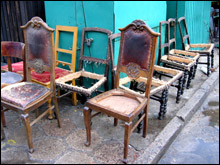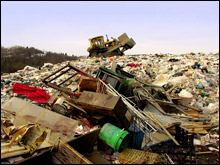Got a garage full of stuff you don’t need? Try posting it on Freecycle. No Freecycle group in your area? Start your own.

A new deal has some Freecyclers down
in the dumps.
This has been the happy mantra of Freecyclers since the grassroots online exchange started up in 2003. More than a million people all over the world have become members, via some 2,600 local groups. Thousands of tons of useful goods have been kept out of the garbage. The media has been charmed.
But behind the scenes at the Freecycle Network, as it’s formally known, the honeymoon may be over. Founder and executive director Deron Beal recently accepted the network’s first corporate support, in the form of a $130,000 sponsorship from the largest garbage company in the U.S., Waste Management, Inc. While some say the move is necessary for success, others are crying “hypocrisy” and leaving by the score. Meanwhile, moderators of local Freecycle groups, which have long operated independently, are bridling at a move toward centralization. Has Freecycle run its course?
First, the funding: Beal says WM came to him with the sponsorship proposal in 2004. At the time, he was gearing up to secure the trademark on the Freecycle name. Success in that endeavor has been elusive: an unrelated Florida company beat Beal to the trademark office by just a few months. He plans to mount a legal challenge to prove he has a prior right to the name, and said the sponsorship money is critical to that battle. The first check arrived in February, and visitors to Freecycle.org will now find WM linked as a sponsor. Actually, as the only sponsor.
The money also allowed Beal to quit his day job and begin drawing a paycheck from Freecycle. He had been working for RISE, Inc., a Tucson, Ariz., nonprofit that combines recycling and job training.* Shifting to Freecycle full-time, he said, will mean better service for the network’s 4,000 moderators and 1.2 million members. The money will also help improve the website, which has until recently been somewhat rudimentary.
The garbage giant announced its sponsorship in late April and, says company spokesperson Heather Browne, plans to roll out a public-relations campaign that will urge people to cut down on waste by using Beal’s creation. “We have to exhibit a daily commitment to environmental stewardship, and Freecycle allows us to be able to further exemplify that,” Browne said.
Indeed, WM has a long history of funding environmental causes; it has been a leading sponsor of Earth Day for years. But in 1990, it was denied membership in the Environmental Grantmakers Association, the group of foundations whose support is critical to the movement. The association said WM had “engaged in a pattern of abusive corporate conduct involving repeated violations of both criminal and civil laws, with the effect of endangering and degrading the environment,” the Chronicle of Philanthropy reported at the time.
Recent events suggest that the Houston, Texas-based company, which posted $939 million in profits last year, hasn’t changed. For nearly 20 years, it has been plagued by scandal, from accounting misdeeds to chronic pollution problems to allegations of mob ties. In 1999, for example, it was accused of illegally dumping medical waste in a Virginia landfill not suited for that purpose; in 2003, Texas levied its largest-ever landfill fine for noxious odors at a WM dump near Austin; and this spring, fire erupted underground at a WM-operated dump in Hawaii, where state officials also found fluid leakage and said the dump had been overfilled, making it unstable.
Waste Management, Want Not
The new sponsor hardly seems a good fit for a movement like Freecycle, some members say. While the community of local moderators, known as the Modsquad, usually gets to vote on important administrative matters, it wasn’t allowed to vote on the grant. Beal said there wasn’t time, and that it wouldn’t be appropriate to have moderators vote on such “binding” matters.

Does Waste Management want a seat at
the table?
“I certainly felt a bit deceived,” said Eric Burke, founder of the Freecycle group in Anderson, S.C. “Had the sponsor been an environmental benefactor, a software company, or just about anyone else, I think most of the [local group] moderators would have seen it as good news.”
Since learning of the WM grant, Burke has left Freecycle and founded FreeSharing.org, one of several splinter groups that serve as refuge for disillusioned Freecyclers. Accurately measuring the dissent is difficult; one former moderator estimates that hundreds of local groups have left the network.
“It’s terribly disappointing,” said fellow defector Rosemary Hill, who founded the Freecycle group in Bakersfield, Calif. She, too, has left the network and renamed her group. “Freecycle was a good thing, a wonderful thing. I think it’s all about money now.”
But others say the sponsorship is not such a bad deal. “Waste Management does not have a good reputation in Alabama,” acknowledged Tami Tilkin, Freecycle moderator in Birmingham. “The name is practically synonymous with a notorious hazardous waste landfill in the western part of the state. However, I don’t think the relationship … is a negative association. As I see it, Waste Management is paying money to ‘greenwash’ their image a bit. They have not bought control of Freecycle.”
Beal echoed that, saying WM’s sponsorship allows the company to claim it is addressing all three “R’s” in the recycling triangle, including reuse. “They have the right to tell the world what a wonderful thing they are doing in support of us,” he said. “We have our first underwriter, and we’re tickled about what that enables us to do for our members.”
This conflict illustrates that environmental grantmaking is a “messy business,” said Robert Brulle, associate professor of sociology and environmental science at Drexel University in Philadelphia. “Corporations only give to enhance their public image. That’s sort of a general rule, and there’s nothing surprising about that,” he said, adding that many green groups rely on grants from corporations with imperfect records. The key, Brulle said, is whether the gift comes with strings attached, and whether it reflects the first step toward gaining a controlling influence. In this case, he pointed out, “on the basis of one grant, it’s kind of hard to say.” However, past appointments of WM executives to the boards of the National Audubon Society and the National Wildlife Federation have generated controversy.
Fast, Cheap … and Out of Control?
Control is also at stake in the other major issue currently eating at Freecyclers. Most local groups operate under an umbrella run by Yahoo!, with the moderator having control over member info and transactions. But last summer, Beal required every local moderator to add him as an “owner” with full moderator powers. Beal said this was essential, because some moderators had abandoned their groups, or failed to control spammers.
Though the Modsquad approved Beal’s change, many moderators worried they’d be giving him power to collect private information, distribute advertising, and take over their groups at any time. Beal said he has no such plans. “I only initiate the bare minimum rules that we all need to follow for this thing to work,” he said.
While Freecycle functions like an online discussion forum, its structure is unique. Such forums are often like a train; they might add more cars, but the train remains under the founder’s control. For example, Craigslist, the wildly popular discussion and advertising forum born in the San Francisco Bay Area, expands to serve other cities only when the founders see sufficient demand; each new city is moderated by Craigslist, not a local person. In other words, Craigslist is always driving the train.
Freecycle, on the other hand, basically said, “Take the name, but drive your own train.” So it became a community of small discussion groups, each with its own conductor. Now, two years later, it’s hardly surprising that some people don’t want another conductor on board. Those who refuse to add Beal as moderator have been told to stop using the Freecycle name, and in some cases, he has convinced Yahoo! to shut down groups that don’t comply.
Despite Freecycle’s growing pains, Tilkin said most moderators and users remain unruffled by the changes. She calls Beal a “wonderful role model” who has guided Freecycle through incredible growth, while keeping its purpose intact. “It’s not the same little grassroots effort it was, but Freecycle remains true to its mission,” she said. “It provides a 100 percent free service to keep usable items out of landfills.”
And though many former boosters are now feeling down in the dumps about Freecycle, Beal tries to remain positive. “There’s a hell of a lot of flying by the seat of your pants going on, and we’re doing the best we can to work with all the interests and wishes that are out there,” he said. “It really is half a miracle that this is working at all.”
*[Correction, 20 May 2005: This article originally stated that RISE, Inc., is based in Minnesota.]



